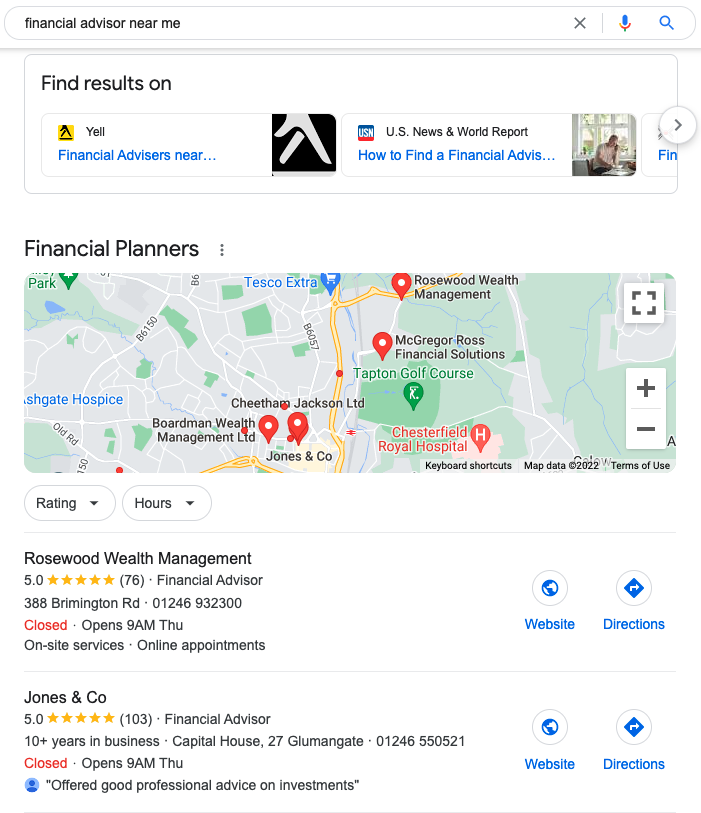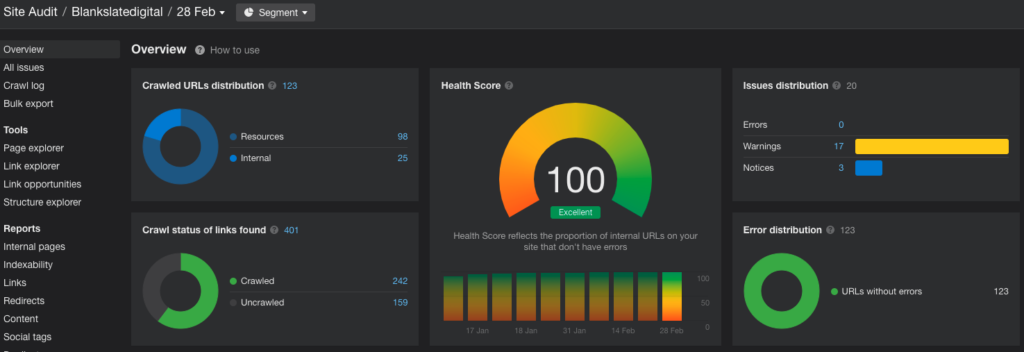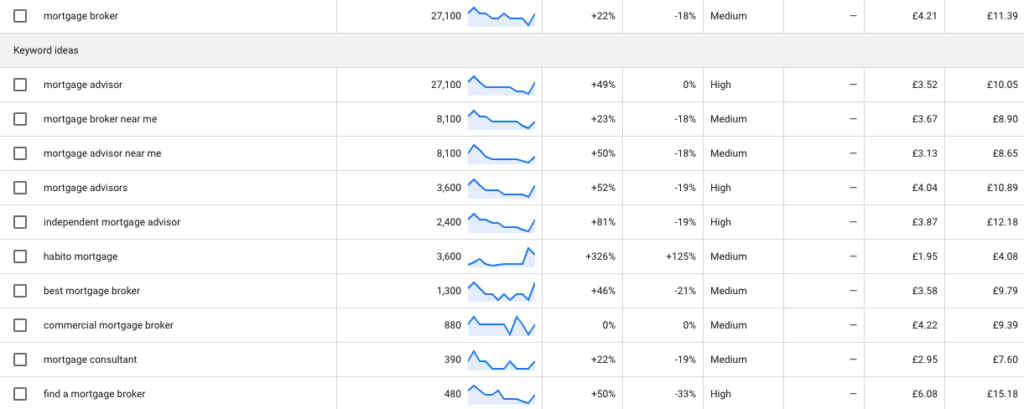Not only is the financial services industry awash with fierce competition, but it can also be a legislation nightmare with strict rules on what you can and cannot say within your content.
This makes Search Engine Optimisation (SEO) in the financial sector more tricky to approach than other industries – but hey, we love a good challenge!
Why do we know what we’re talking about? Well with years of experience working within the field and a proven track record, we have cracked the code to nailing fantastic SEO for businesses who deal within the financial industry.
That’s why in this article, we will explain our process to create the perfect SEO strategy for businesses (especially small ones) in the financial services industry. Read on to learn about:
- The definition of Financial Services SEO
- The benefits of Financial Services SEO
- How to do SEO for Financial Service websites
But first, we dive into an explanation of some cautionary steps needed when approaching SEO for the finance industry.
Setting the foundations…
The core fundamental of a good SEO strategy for any business that deals in finance is to build authority, legitimacy and trust for your brand.
The 3 core principles of SEO translate perfectly for building a reputation within the industry; content, technical and website authority.

But for the financial sector, it’s important to break this down further, as search engines such as Google have strict quality standards for content.
Google has three main quality standards that directly apply; EAT (Expertise, Authority, Trustworthiness) YMYL (Your Money Your Life) and Beneficial Purpose.
These standards apply to nearly every website, but they should be at the forefront of any financial SEO strategy as the content Google is choosing to serve on the results page can literally change someone’s life. It’s absolutely essential that every website in the search results can be trusted so Google can ensure it is not responsible for sending users to scam, spam or incorrect websites.
So what are these quality standards and how can you be sure your website is compliant?
EAT
First published in 2014 in Google’s Search Quality Guidelines, EAT is used to value websites that demonstrate expertise, authority, and trustworthiness. It is especially important for websites that offer financial services as these fall into YMYL – Your Money Your Life – content. So, with all other factors equal, a page that demonstrates better expertise, authority, and trustworthiness will rank higher.
- Expertise – Your content depicts you as an expert in your field
- Authority – You are accepted as a leader within the niche
- Trustworthiness – You are trusted to provide accurate and honest information.
YMYL
YMYL (Your Money Your Life) content is depicted as information that; if presented untruthfully, inaccurately or deceptively then it could have a direct impact upon someone’s life. Whether it be the reader’s health, safety, happiness – or most importantly for you – their financial stability.
This deeply matters for financial services SEO and so all the content you publish should be written, or at the very least edited, by experts with relevant experience and knowledge.
Beneficial Purpose
Google defines beneficial purpose as “Websites and pages should be created to help users”. This means that all the content you publish should be centred around the desire and intent of the user.
Everything on your website should provide value and the first step to figure this out is to understand the true purpose of your page.
Right, with all that out of the way, let’s dive into the ultimate SEO strategy for businesses in the financial services industry!
The definition of Financial Services SEO
SEO is a core fundamental of digital marketing for any business within the financial services or banking sector. It helps you increase brand awareness, reach larger audiences and help people find your website easier from both branded and non-branded searches.
Non-branded searches, such as “mortgage broker near me” hold a huge potential of consumers who are searching for the exact service you offer. By optimising your website to rank for non-branded keywords that directly relate to your offering, you will appear at the top of the search results and gain a new source of customers.
But in order to position yourself in front of these high-potential customers, you will need to offer valuable content, a healthy, secure website and build your site authority through high-quality backlinks from industry-relevant sources.
The benefits of improving SEO for Financial Service businesses
Improving the search engine optimisation of your website allows you to reach more customers online. By placing your website in front of people who are searching for exactly what you offer, you can open up a whole new stream of revenue – thus growing your business.
By investing in optimising your financial services website for search engines, you can potentially see a significant return on investment, but only when you approach it with the right strategy and process.
Increase brand awareness
People who are seeking out any kind of financial service will be doing a huge amount of research as it will directly impact their life. This means that building brand awareness and trust should be a core foundation of your marketing strategy.
As your website begins to show for more searches, more people will become aware of your brand. When your SEO strategy develops, people will begin to recognize your brand and associate it as a big player in the field. Over time, as your content delivers for what people are searching for, your credibility will increase and your brand will be positioned as an expert in the niche.
Improve the quantity and quality of website traffic
A direct outcome of your SEO strategy is an increase in the amount and quality of traffic that is organically reaching your website.
If you begin by targeting lower-search volume but highly relevant terms, you will notice a fantastic conversion rate as your website directly caters for what users are looking for. Following this, as your website begins to rank for more generic, but far higher search volume terms, you can achieve a massive increase in the number of people on your website, and consequently, increase conversions even if it comes with a slightly lower conversion rate.
Outrank the competition
The financial sector is already a highly competitive industry with many large and established players taking up the majority of organic search results. With no signs of slowing, the industry also continually increases with new competitors showing up all the time.
However, the space has become increasingly fragmented over the years, as smaller players enter the market. In order to gain visibility in such a saturated market, SEO is highly important.
To outrank your competition, you simply need to do better than they are, which is easier said than done. So having a specialist SEO strategy that produces outstanding content that perfectly matches the intent and needs of your target audience is the ideal way to beat the competition.
Local Presence
Local SEO also plays a huge role for financial services, as for certain queries people search, their intent might actually be to find a local business.
This is why it’s crucial to ensure you not only optimise on-page for location-based terms but also off-page elements such as directory listings and your Google My Business profile. This will help ensure you are right at the top of search results for anyone who is searching for your type of business in the local area.

Generate more leads
As with any type of marketing, the most important measure of success is the return on investment.
As SEO generates more visitors to your website, you can expect to see an increase in leads which will eventually convert into paying customers.
Typically, SEO is one of the highest converting traffic sources as you capture the attention of interested people and instil a level of trust in your business even before they click through to your website from search results.
How to do SEO for Financial Service websites
So how can you go about reaping all the benefits that organic search has to offer? Here is our guide to get your financial services SEO started and begin growing your business.
Audit your website
The first step to improving the optimisation of your website is a full SEO audit. This should contain a full analysis of your on-site content, technical status and authority. By auditing the existing elements of your website it allows you to identify the areas of weakness that first need to be improved, as well as identify any quick wins you can conduct.
To audit your site, we recommend you manually comb through everything, whilst also using automated tools such as Ahrefs site audit, Sitebulb or the SEMRush audit tool for technical aspects.

Audit your data
We cannot stress this enough, analyse your data! It’s one thing to know where your website can be improved, but it’s just as important to know the data behind it. This allows you to justify changes and set out key performance indicators to establish goals for your SEO strategy.
When auditing data you should look into – Google Analytics, Google Search Console, visual data such as HotJar and SEO specific data using a tool like Ahrefs.
What you are looking for within the data is to identify where users are coming from and how they are interacting with your website. From here you can establish where the areas of weakness are and what steps are needed to improve them.
Keyword research
Now you know what the current status of your site is, the next step is to research and establish what keywords you want to rank for. There are a few important factors to consider when looking at keywords;
- How competitive it is
- The current search engine results page (SERP)
- The monthly search volume
- The search intent
Elaborating more on that last point, search intent is highly important when deciding what keywords you should go after. To evaluate it, you need to put yourself in the position of the user behind a given search query. For example, if someone is searching for “help to buy scheme”, chances are they are looking to find some more information about the different options available for first-time buyers. However, if a user is searching for “first time buyer mortgage broker” then they have already done their research and are now ready to evaluate the different mortgage brokers available to them. This means that for the first query, the results will be informational, whereas the second will be more transactional.
One final thing to note, avoid targeting the same keywords across multiple pages as this can result in pages on your website competing against each other, this is known as keyword cannibalisaion.

Analyse the competition
Having a strong understanding of your competitors is vital for the success of your SEO strategy. Due to the competitive nature of organic search, you are essentially fighting against everyone else in your industry for the top 10 rankings for any given keyword.
Provided your website has a good technical SEO foundation, and a decent authority, your main point of focus should be to create fantastic content that provides value to users searching for relevant terms.
However, even though having better content than your competitors is a large percentage of the fight, if your website has a low authority (little to no backlinks) then you stand no chance against another site that does.
As everyone continues to further optimise their website, it’s vital to track what keywords your competitors are ranking for, as well as keep track of their backlink profile to ensure that you respond proactively to changes rather than reactively. There are some great tools out there you can use to track your performance against competitors, but we recommend Ahrefs for the most comprehensive data.
Technical SEO optimisation
Technical optimisation is the foundation of any website. In the worst-case scenario without it, a site simply would not rank in search engines as Googlebot and other crawlers are not allowed to index the site.
Technical SEO optimisation covers a broad spectrum of different aspects on your website, but some key areas to focus on are:
- XML sitemap optimisation
- Crawlability and indexing
- Site speed
- On-page elements and structure
- Internal link structure and broken or redirected links
This is just scratching the surface of technical SEO, but by ensuring your site is well optimised for these areas, you can be assured that Google and other search engines can easily access your content and make it eligible for organic rankings.
Improve existing content
Unless you have stumbled on this guide whilst making a brand new website, chances are you already have some content. Rather than just deleting this and starting from scratch, take a look at what keywords your different pages already rank for and re-optimise the content accordingly to take advantage of low-hanging keywords.
Low-hanging keywords are keyword rankings your website has but do not receive any traffic. Typically in positions 10-30. Because these keywords are already ranking, you have a clear signal from search engines it likes your website for that given term, and it just needs some further optimisation to get it onto the first page of search results.
The best places to optimise your existing content are going to be the homepage, service pages and any well-performing blogs. I’d start with the homepage and work through each service page based on a time:reward ratio for the best chance that you will get a ‘quick-win’ and kick that page into the top spots.
Improving and re-optimising content is a never-ending task, tying into your competitor analysis, you should continually be watching your keyword rankings on a monthly or even weekly basis and when you notice negative movements, you should look to how you can improve the content of the page as well as building some backlinks to it if applicable.
Pro tip! Re-optimising your content isn’t just written copy, create some useful graphics or an informative video that can accompany what’s already on the page – these all send positive ranking signals to search engines as it provides more value to the user and can even increase your on-page metrics such as session duration and engagement.
Create informational content
Informational content is not only fantastic for ranking for keywords on its own but by creating a great content strategy that uses content pillars and structure you can hope to increase the chances of your key service pages ranking for more competitive terms.
Providing informational content on your website allows you to provide value, which boosts your authority in the financial niche.
This type of content can come in many different forms;
- Written content such as well-researched blogs and long-form articles
- Infographics and interactive resources
- Free tools (such as a mortgage calculator)
- Industry studies and statistical articles
- Videos and podcasts
Content promotion
Whenever you publish a new piece of content on your website. Promote it!
Content promotion is a great way to get new eyes on your content, as well as helping to build backlinks. By getting traffic to your new blog or article as soon as it’s published, it gives Google a ranking signal that can help get your content indexed a lot faster than without.
Some of the best ways to promote new content are;
- Sending a curated email to subscribers
- Actively share and re-share on social media
- Send an outreach email to other blogs or businesses you mentioned in the article
- Submit the post to online communities such as Reddit and Slack
- Answer related questions on Quora
- Paid advertising on social media, youtube and Google Ads
Pro tip! Make sure you implement Open Graph on your web pages so that they look their best when shared across social media!
Local SEO
As we touched on before, local SEO is a great way for financial service businesses to get new customers online. For example in the UK “financial advisor near me” is searched 14,000 times each month. Now, you won’t be able to rank for this term nationwide as it is of local intent, but there will no doubt be people in your local area who are searching this and many other similar terms.
In order to ensure you rank right at the top of search results for these highly-local, high-intent keywords there are some key steps to take, both on and off your site.
On your site, make sure you have the business address (or multiple is applicable) clearly listed, ideally in the footer. If you have multiple locations it might also be a good idea to have multiple location pages that contain information about each different location.
Optimise your Google My Business profile to contain as much information as possible, and remember to add regular updates and posts. Also, look to get some reviews on your profile, as the more reviews you have, the more likely you are to show up on Google maps and local search results.
Ensure that you have listings set up and Name Address and Phone (NAP) consistency across all directories. When pulling the results for local searches, Google uses your listings on Yelp, Yell etc. to cross-reference your business and ensure legitimacy. These all have a minor signal to Google, so make sure you check all your listings. This free tool from Yell is perfect for quickly checking the consistency of directories.
Link building
As we have previously mentioned throughout this article, link building should be one of the core foundations of your SEO strategy, as the nature of financial businesses is dependent on authority and trustworthiness.
Google uses links from other websites as a ‘vote of confidence’ to determine which sites are best suited to rank on Google. Typically, the more competitive and higher volume a keyword is, the higher the authority you will need to be in order to rank highly in the results.
Link building is a huge topic and there are many methods you can use to increase the authority of your website. Below, we list a few of the core fundamentals, but you should further research link building strategies (we like the Ahrefs blog!);
- Email outreach and content promotion
- Broken link building
- Unlinked mentions
- Guest blogging
- Digital PR
Remember! The one thing that is most important when it comes to link building is to only use white-hat techniques. Google has guidelines on link building and you should never break these, as paying for dodgy links or getting spam links could result in a penalty from Google and have the complete opposite effect of what you are trying to accomplish.
Review, re-audit and re-do
The nature of SEO makes it an ongoing process. To reap the benefits of organic search you need to continually review, optimise and adapt. SEO is without doubt one of the most drawn-out long-term marketing strategies, but the results are 100% worth it.
As long as you want your business to show at the top of search results and be continually picked up for new keywords, you need to repeat these tips and further grow your strategy. When implemented correctly, this will create evergreen results that speak for themselves, proving a fantastic return on investment.
Conclusion
Financial services SEO is hard to crack due to its competitive nature, but by following all the best practices, ensuring your website directly answers the need of users and provides value, you should see some pretty impressive results.
If you are looking for more information on how you can improve your website’s organic performance, get in touch with our expert SEO consultants.


